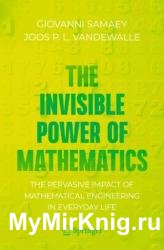 Название: The Invisible Power of Mathematics: The Pervasive Impact of Mathematical Engineering in Everyday Life Название: The Invisible Power of Mathematics: The Pervasive Impact of Mathematical Engineering in Everyday Life
Автор: Giovanni Samaey, Joos P. L. Vandewalle
Издательство: Springer
Год: 2023
Страниц: 176
Язык: английский
Формат: pdf (true), epub
Размер: 19.8 MB
How does homebanking work? How are board games developed? How reliable can wind energy get? How do we discover forged paintings? Do smart girls stay single? How dangerous can a bioterrorist get? In all these questions (and many others), mathematics plays a crucial role in the search for an answer.
This book tells the story behind twenty of these questions. This is explicitly not a mathematics book, but a book about the crucial role that mathematics plays in devising the creative solutions the world needs. The questions are divided into three categories: home, garden and kitchen mathematics; mathematics for the workplace; and mathematics for tomorrow's society. The themes illustrate not only the incredibly broad applicability of mathematics in the world around us, but also the great diversity of useful mathematical techniques.
To find useful pages, search engines need to know very well what content each web page contains. To do so, they use computer programs that continuously browse from page to page and store all the content on those pages in a large database. That is called indexing, and the programs that do that are called web crawlers. They keep track of which words appear on each page, how often they appear, and perhaps which words are close to each other. In this way they can very quickly find all the pages that might interest you. But the important work still needs to be done: in what order are the results shown? How to make sure that the most relevant pages are at the top?
Our brains can do a lot. We recognise others. We read license plates, road signs and signposts while driving, almost effortlessly. Financial experts recognise fraud ‘when they see it’. Psychologists are trained to quickly assess someone’s personality. Can a computer do all that? And if so, do we want that? There is also a case for using computers for pattern recognition. Owing to advances in technology, so much data is collected and maintained that it is simply infeasible to have everything processed by humans. Think, for example, of isolating a few suspicious financial transactions. Moreover, there are many situations in which the available data is not suitable for human interpretation. Genetic information is a typical example. And computers are probably more immune to human errors of thought or randomness when detecting patterns. Can we make the computer as efficient as the human brain for these kinds of tasks, or maybe even more efficient? If so, how? And what are the benefits and dangers?
Contents:
Part I. Mathematics in Everyday Life
1. Worry-Free Online Shopping
2. Reach Everyone, Anywhere, in Just Six Steps
3. Are the Polls Right?
4. Cochlear Implants Help the Deaf Hear Again
5. Google PageRank, or the Needle in the Haystack
6. Fun and Game Theory
Part II. Mathematics in the Workplace
7. High Winds on High Mills
8. Reducing Factory Noise
9. Virtual Architecture and Engineering
10. The Art of Forgery
11. The Right Bike in the Right Place
12. Can Computers Detect Fraud? (And Do We Want Them To?)
13. Industrial Fortune Tellers Predict Profit
Part III. Mathematics for Tomorrow’s Society
14. Do Smart Girls Stay Single Longer?
15. What If There’s More Data Than Storage?
16. Driving Without a Driver
17. How Vulnerable Are Our Banking Systems?
18. Can We Predict Climate Change?
19. War and Peace
20. Pandemics: From Ebola and HIV to Bioterrorism and the Coronavirus
Скачать The Invisible Power of Mathematics: The Pervasive Impact of Mathematical Engineering in Everyday Life
|